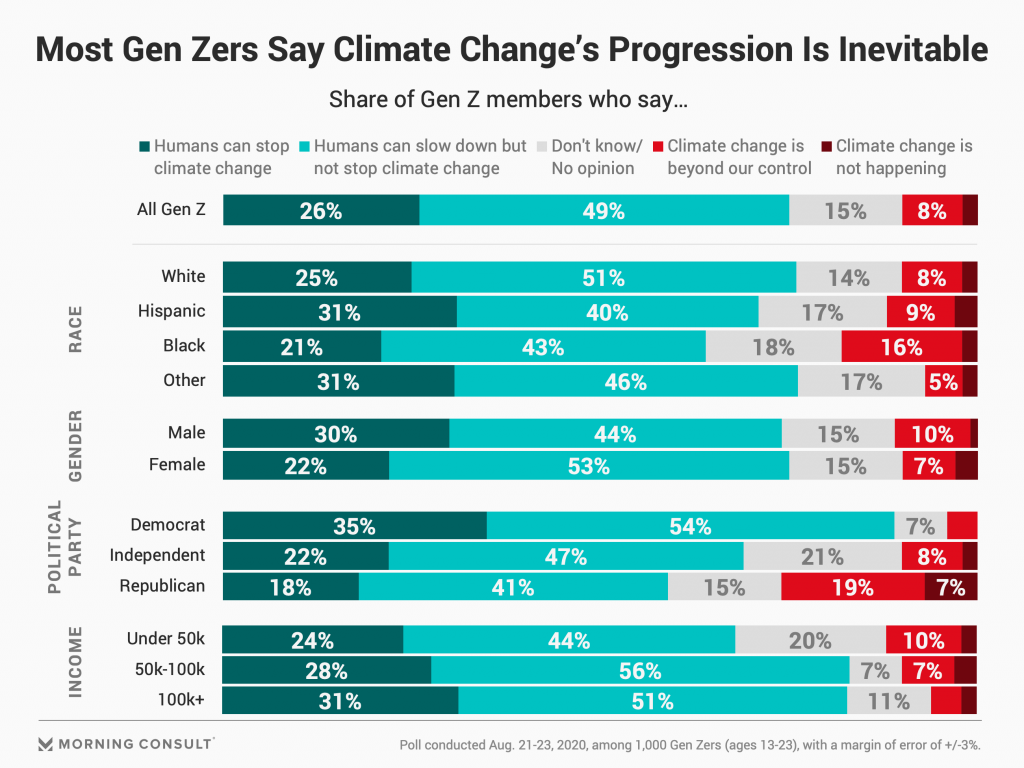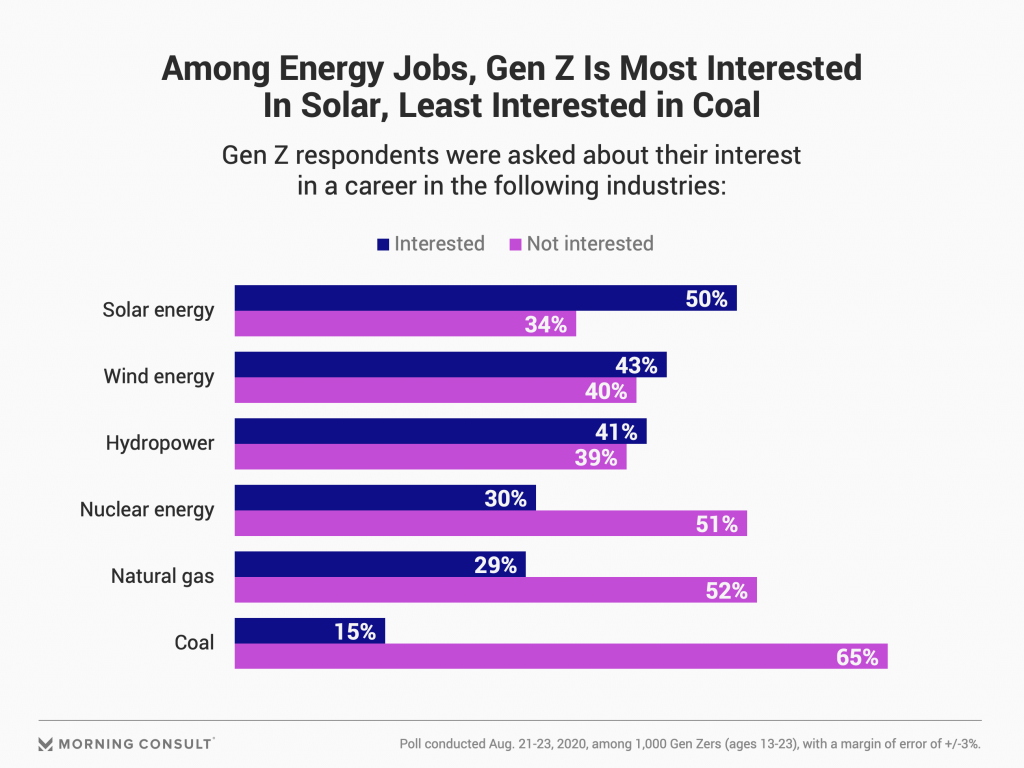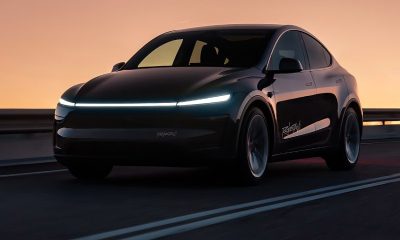

News
Tesla Energy’s true potential shines as study shows Gen Z prefers renewables, not coal
During the second quarter earnings call, Elon Musk highlighted that the potential of Tesla Energy exceeds that of the company’s automotive business simply because the utility sector is much larger than the car industry. Fortunately for Tesla, it appears that the upcoming ramp of its energy business is coming just at the right time, as a recent study has determined that members of Gen Z are far more interested in careers relating to renewable energy.
Morning Consult, a US-based data intelligence firm, recently conducted a climate change study on members of Generation Z aged between 13 and 23. The study was conducted on August 21-23 and it involved about 1,000 participants, with a margin of error of 3 percentage points. In a post about its survey, the data intelligence firm noted that overall, the study revealed that Gen Z accepts climate change as a fact, and a significant number of them are willing to do something about it.
As could be seen in the graphic below, 26% of the respondents in the study believe that humans have the capability to stop climate change. A larger number, 49%, believe that while climate change could not really be stopped, it could be slowed down. Encouragingly, only 2% of the study’s respondents stated that they do not believe climate change is happening, and only 8% stated that climate change is beyond humans’ control.

What is particularly notable in the study’s results was the fact that 73% of the survey’s respondents stated that they are “very” or “somewhat” concerned about the impact of climate change on the environment. The data intelligence firm noted that these values would likely have an effect on policies in the near future. “While many of the poll’s respondents are not yet able to vote, as the generation that has given the world activists such as Greta Thunberg and Xiye Bastida comes of age, its values will be of increasing relevance to policymakers,” the firm noted.
Amidst the data gathered by the intelligence firm, one particular point stood out. Gen Z-ers, most of whom have lived through a time when the effects of climate change have been more prominent, are focused on careers relating to sustainability. When asked about their career prospects, the vast majority of the study’s respondents stated that they are interested in sectors that contribute to the fight against climate change, like solar and wind. Sectors whose emissions harm the environment such as coal, on the other hand, hold very little appeal.

Based on the results of Morning Consult’s study, 50% of the respondents noted that they were interested in pursuing a career in the solar industry. Careers in wind and hydropower are a close second and third, with 43% and 41%, respectively. Interestingly enough, the coal industry, a key driver of the industrial age, only holds appeal to 15% of the study’s respondents, making it the least popular career option for Gen Z members. Alternatives to renewables like solar and wind, such as nuclear power, also seem to hold little appeal for the survey’s respondents.
“Fifteen percent of Gen Z-ers, meanwhile, expressed interest in a career in coal, with 65% saying they were not interested. The natural gas sector — which proponents have long touted as facilitating the economy’s transition to more renewable energy — was also unpopular, with 29% interested and 52% not interested. This is consistent with the industry’s own polling in 2017, which has prompted concern from energy executives about how to recruit new talent in the coming decades. And while nuclear energy has similarly been championed as playing a crucial role in the transition, the sector proved statistically as unpopular as natural gas,” the intelligence firm noted.
With this shift in mind, companies like Tesla are perfectly positioned as the preferred places of work for the next generation. As Gen Z steps away from fossil fuel-based jobs, the opportunities for businesses such as Tesla Energy become larger. Companies that actively address the effects of climate change, after all, are far better alternatives to workplaces whose practices actively destroy the planet. Perhaps this is already starting in the automotive sector, as companies like Tesla are becoming increasingly popular among engineering graduates. Beyond the appeal of working for a rockstar CEO like Elon Musk, Tesla’s disruptive approach and its open, ambitious mission could very well be considered attractive by prospective employees.
News
Tesla UK sales see 14% year-over-year rebound in June: SMMT data
The SMMT stated that Tesla sales grew 14% year-over-year to 7,719 units in June 2025.

Tesla’s sales in the United Kingdom rose in June, climbing 14% year-over-year to 7,719 units, as per data from the Society of Motor Manufacturers and Traders (SMMT). The spike in the company’s sales coincided with the first deliveries of the updated Model Y last month.
Model Y deliveries support Tesla’s UK recovery
Tesla’s June performance marked one of its strongest months in the UK so far this year, with new Model Y deliveries contributing significantly to the company’s momentum.
While the SMMT listed Tesla with 7,719 deliveries in June, independent data from New AutoMotive suggested that the electric vehicle maker registered 7,891 units during the month instead. However, year-to-date figures for Tesla remain 2% down compared to 2024, as per a report from Reuters.
While Tesla made a strong showing in June, rivals are also growing. Chinese automaker BYD saw UK sales rise nearly fourfold to 2,498 units, while Ford posted the highest EV growth among major automakers, with a more than fourfold increase in the first half of 2025.
Overall, the UK’s battery electric vehicle (BEV) demand surged 39% to to 47,354 units last month, helping push total new car sales in the UK to 191,316 units, up 6.7% from the same period in 2024.
EV adoption accelerates, but concerns linger
June marked the best month for UK car sales since 2019, though the SMMT cautioned that growth in the electric vehicle sector remains heavily dependent on discounting and support programs. Still, one in four new vehicle buyers in June chose a battery electric vehicle.
SMMT Chief Executive Mike Hawes noted that despite strong BEV demand, sales levels are still below regulatory targets. “Further growth in sales, and the sector will rely on increased and improved charging facilities to boost mainstream electric vehicle adoption,” Hawes stated.
Also taking effect this week was a new US-UK trade deal, which lowers tariffs on UK car exports to the United States from 27.5% to 10%. The agreement could benefit UK-based EV producers aiming to expand across the country.
News
Tesla Model 3 ranks as the safest new car in Europe for 2025, per Euro NCAP tests
Despite being on the market longer than many of its rivals, the Tesla Model 3 continues to set the bar for vehicle safety.

The Tesla Model 3 has been named the safest new car on sale in 2025, according to the latest results from the Euro NCAP. Among 20 newly tested vehicles, the Model 3 emerged at the top of the list, scoring an impressive 359 out of 400 possible points across all major safety categories.
Tesla Model 3’s safety systems
Despite being on the market longer than many of its rivals, the Tesla Model 3 continues to set the bar for vehicle safety. Under Euro NCAP’s stricter 2025 testing protocols, the electric sedan earned 90% for adult occupant protection, 93% for child occupant protection, 89% for pedestrian protection, and 87% for its Safety Assist systems.
The updated Model 3 received particular praise for its advanced driver assistance features, including Tesla’s autonomous emergency braking (AEB) system, which performed well across various test scenarios. Its Intelligent Speed Assistance and child presence detection system were cited as noteworthy features as well, as per a WhatCar report.
Other notable safety features include the Model 3’s pedestrian-friendly pop-up hood and robust crash protection for both front and side collisions. Euro NCAP also highlighted the Model 3’s ability to detect vulnerable road users during complex maneuvers, such as turning across oncoming traffic.
Euro NCAP’s Autopilot caution
While the Model 3’s safety scores were impressive across the board, Euro NCAP did raise concerns about driver expectations of Tesla’s Autopilot system. The organization warned that some owners may overestimate the system’s capabilities, potentially leading to misuse or inattention behind the wheel. Even so, the Model 3 remained the highest-scoring vehicle tested under Euro NCAP’s updated criteria this year.
The Euro NCAP’s concerns are also quite interesting because Tesla’s Full Self-Driving (FSD) Supervised, which is arguably the company’s most robust safety suite, is not allowed for public rollout in Europe yet. FSD Supervised would allow the Model 3 to navigate inner city streets with only minimal human supervision.
Other top scorers included the Volkswagen ID.7, Polestar 3, and Geely EX5, but none matched the Model 3’s total score or consistency across categories. A total of 14 out of 20 newly tested cars earned five stars, while several models, including the Kia EV3, MG ZS, and Renault 5, fell short of the top rating.
Elon Musk
Why Tesla’s Q3 could be one of its biggest quarters in history
Tesla could stand to benefit from the removal of the $7,500 EV tax credit at the end of Q3.

Tesla has gotten off to a slow start in 2025, as the first half of the year has not been one to remember from a delivery perspective.
However, Q3 could end up being one of the best the company has had in history, with the United States potentially being a major contributor to what might reverse a slow start to the year.
Earlier today, the United States’ House of Representatives officially passed President Trump’s “Big Beautiful Bill,” after it made its way through the Senate earlier this week. The bill will head to President Trump, as he looks to sign it before his July 4 deadline.
The Bill will effectively bring closure to the $7,500 EV tax credit, which will end on September 30, 2025. This means, over the next three months in the United States, those who are looking to buy an EV will have their last chance to take advantage of the credit. EVs will then be, for most people, $7,500 more expensive, in essence.
The tax credit is available to any single filer who makes under $150,000 per year, $225,000 a year to a head of household, and $300,000 to couples filing jointly.
Ending the tax credit was expected with the Trump administration, as his policies have leaned significantly toward reliance on fossil fuels, ending what he calls an “EV mandate.” He has used this phrase several times in disagreements with Tesla CEO Elon Musk.
Nevertheless, those who have been on the fence about buying a Tesla, or any EV, for that matter, will have some decisions to make in the next three months. While all companies will stand to benefit from this time crunch, Tesla could be the true winner because of its sheer volume.
If things are done correctly, meaning if Tesla can also offer incentives like 0% APR, special pricing on leasing or financing, or other advantages (like free Red, White, and Blue for a short period of time in celebration of Independence Day), it could see some real volume in sales this quarter.
You can now buy a Tesla in Red, White, and Blue for free until July 14 https://t.co/iAwhaRFOH0
— TESLARATI (@Teslarati) July 3, 2025
Tesla is just a shade under 721,000 deliveries for the year, so it’s on pace for roughly 1.4 million for 2025. This would be a decrease from the 1.8 million cars it delivered in each of the last two years. Traditionally, the second half of the year has produced Tesla’s strongest quarters. Its top three quarters in terms of deliveries are Q4 2024 with 495,570 vehicles, Q4 2023 with 484,507 vehicles, and Q3 2024 with 462,890 vehicles.
-

 Elon Musk5 days ago
Elon Musk5 days agoTesla investors will be shocked by Jim Cramer’s latest assessment
-

 News1 week ago
News1 week agoTesla Robotaxi’s biggest challenge seems to be this one thing
-

 Elon Musk2 weeks ago
Elon Musk2 weeks agoFirst Look at Tesla’s Robotaxi App: features, design, and more
-

 News2 weeks ago
News2 weeks agoWatch Tesla’s first driverless public Robotaxi rides in Texas
-

 News2 weeks ago
News2 weeks agoWatch the first true Tesla Robotaxi intervention by safety monitor
-

 Elon Musk2 weeks ago
Elon Musk2 weeks agoTesla to launch in India in July with vehicles already arriving: report
-

 Elon Musk2 weeks ago
Elon Musk2 weeks agoTesla officially launches Robotaxi service with no driver
-

 Elon Musk1 week ago
Elon Musk1 week agoA Tesla just delivered itself to a customer autonomously, Elon Musk confirms

















